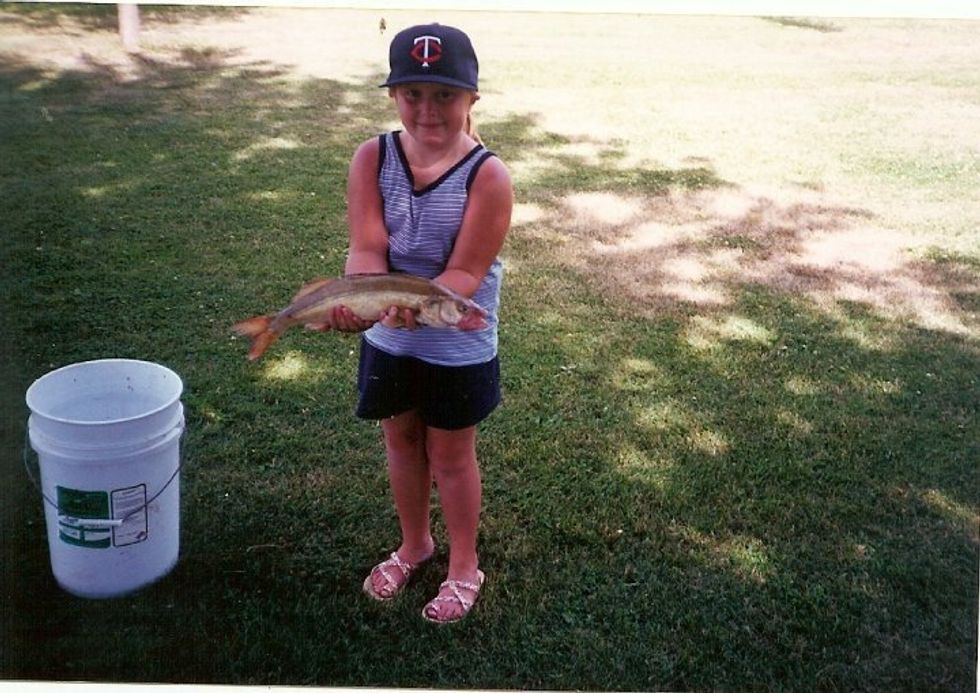Because of my mother’s job, she and my father would go to another state for a career conference nearly every year. Before my sister and I were old enough to stay home alone we would stay at my grandparents' lake home. On the surface, this is a very fond memory. My sister and I spent our time doing puzzles and playing board games with my grandma, going out on the pontoon with my grandpa and making mud pies with the neighbor girls. The week was always packed with activities and times that I will cherish for the rest of my life. However, as I’ve grown and learned more about myself, I’ve come to recall darker moments from these childhood memories.
My sophomore year of college I finally admitted that something was wrong. Nearly every night I would toss and turn, my stomach in knots, tearing up because even though I was so physically exhausted that I could hardly sit up, I still could not fall asleep. I also found it difficult to care about almost anything. I gave up trying to exercise. I begrudgingly dragged myself to work. The classes that were once engaging became a chore. I would sit alone in my room thinking about what makes me who I am and why I no longer feel like I embodied these qualities. Regardless of how little I had to do, I always felt on edge, struggling to figure out what I was forgetting.
I’ve since come to learn that what I was feeling was my version of anxiety. This revelation felt like someone had flipped a switch that shed a new light on my life and allowed me to re-evaluate myself and my past in a way I had never been able to do before.
Returning to the little house by the lake, I watch an 8-year-old me staring at a photo of my parents that sits on a bookshelf in the living room. It is dark, a quarter past midnight. My sister and grandparents are sleeping in their respective rooms. I say a prayer that my parents will be okay in their travels, making sure I only say “amen” once, because if you say it twice it will cancel it out and God won’t hear your prayer. I cannot look at the picture too much longer or my parents’ plane will crash. It doesn’t make sense, but it has kept me up, regardless. Soon I am tired and put all the tragic outcomes out of my head as I climb onto the couch and fall asleep, making sure to check that the door is locked. In the morning no one knows that I cried for an hour that night and I go about the day, putting together puzzles and making mud pies.
These irrational moments of dread were not isolated to weekends at the cabin while my parents were states away. There were days when I had to restrain myself from calling each of my friends to ensure that they still liked me, but I feared that doing that would just irritate them more. I could not take the bus to school because the entire ride was filled with fear at the idea that I would be late, I wouldn’t be prepared, that I would fail because I didn’t get to school 15 minutes early. These were feelings I had quite often growing up, but I always dismissed them as an over-active imagination or the common exaggerations of a child. They were my normal.
The diagnosis of anxiety issues is not uncommon for college-aged students. For at least a decade professionals have been trying to pinpoint the reason for the mental health crisis facing college campuses and how to address them. According to this study done in 2006,
“Significant findings from the most recently published data, based on over 94,000 students surveyed in the spring of 2006, include that 67% of women and 55% of men reported feeling hopeless at times over the last school year, that 47% of women and 38% of men reported feeling so depressed on at least one occasion that they could not function, and that 10% of women and 8% of men seriously considered suicide. Stress was cited as the single greatest impediment to academic progress by both genders, with depression and anxiety also ranked among the top 10 academic impediments.”
While I cannot offer a solution to these problems, I know that it was helpful to me to know that I am not alone and there are many others on my campus and beyond that have dealt with similar feelings.
Coming to terms with my mental health has been a frustrating, terrifying, saddening, but also empowering and enlightening time in my life. Learning that I have had these feelings longer than I knew was horrifying, but at the same time comforted me. And while I still struggle with these issues and how to deal with them, reaching out to family, friends, peers and professionals has helped me a great deal, and I implore anyone else who may be struggling to reach out to someone. Because as cliche as it sounds, it really can get better.




















